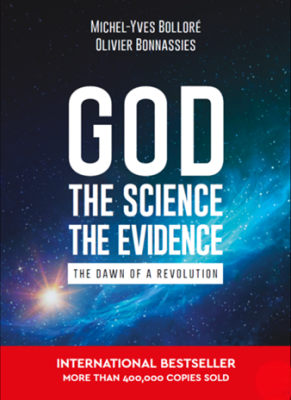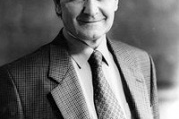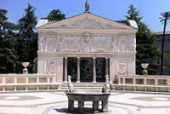Book: God, The Science, The Evidence

A massive best-seller in French for the past four years - God, The Science, The Evidence has just been published this week in English by Palomar - and looks set to attract a much larger audience.
In this book, authors Michel-Yves Bolloré and Olivier Bonnassies distil insights from 62 Nobel Prize winners and more than 100 leading scientists from a wide range of disciplines - from cosmology to physics, biology to chemistry - to show that "in science today, God is more alive than ever."
It's theme is: "Until recently, believing in God seemed incompatible with science. Now, unexpectedly, science appears to have become God's ally."
The first two sentences set the tone: "Never before have so many spectacular scientific discoveries emerged in such a short period of time. These discoveries have overturned our view of the cosmos and forcefully put the question of the existence of a creator God back on the table.
Written in a very accessible style. God, The Science, The Evidence offers a tremendous amount of information, theories, references, quotes and reactions from scientists.
The book is basically in two parts - the first looks at scientific evidences for God - the second examines other sorts of evidence, such as the miracle of the sun at Fatima. The topics discuss the need for a Creator outside the universe.
In the science part the topics are: The 'heat death' of the universe; The 'Big Bang', The 'Fine Tuning' of the Universe and 'The Leap from inert to living Matter'.
The first two topics point to a Beginning and thus a Creator. The third is the incredible precision required for the constants of nature required to sustain life, and the fourth is the total inadequacy of the fashionable idea that self-reproducing molecules form by chance and are chosen by 'survival of the fittest'. The very existence of life should fill us with awe!
The entire book should fill us with a sense of wonder at the mystery, beauty and glory of creation.
The next part on 'Evidence from outside the sciences' is more diffuse. Its topics are not normally bound together with scientific topics in the same book. They deal with the Bible, Jesus, the persistence of the Jewish people, the miracle of the sun at Fatima, the moral conscience, the intelligibility of the universe and the effectiveness of mathematics, the classical proofs of the existence of God. The Fatima miracle of October 13th 1917 is covered at length, with pages of newspaper reports of the time.
Two sections describe the non-intellectual attacks on believing in the existence of God. Scientists and politicians can be as prejudiced as the rest of humanity. Thus in one section are listed some eminent people who attacked the "heat death" theorist Ludwig Boltzmann, including the early Einstein, because an eventual end precludes everlasting existence.
But more deadly was the persecution, described in another section, conducted by the Nazi and Communist authorities in the twenties and thirties, of the proponents of the expansion of the universe, because such theories suggested the need for a Creator.
So, altogether - a wonderful book, written in a racy style, full of information, which will encourage a richer understanding of the history of science and invite readers to challenge their thinking on one of humanity's most profound questions: Is there a creator?
Just the Christmas present for your agnostic friend or relation!
Dr William Chambers is a retired lecturer in Physics and Maths at Kings College, London.
God, The Science, The Evidence by Michel-Yves Bolloré and Olivier Bonnassies
Published by Palomar. ISBN 9789998782402


















